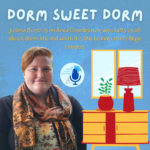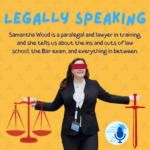The NHHEAF Network
In today’s episode, we talk with Moira Valenti from the New Hampshire Higher Education Foundation (NHHEAF) about paying for college, the Free Application for Federal Student Aid (FAFSA), and how NHHEAF can help students on their way to college.
Find all sorts of videos on NHHEAF’s YouTube channel to help you throughout your college admission process!
Listen to the episode here!
Shownotes:
Today’s joke of the episode is, What do you call a cruise full of college students? and we’ll give you a hint to the punchline: We discuss it in this episode if you’re savvy enough to pick up on it! But if not, you can always listen to our next episode and find out then.
For this episode, we were joined by Moira Valenti, a Senior Education and Career Counselor at the New Hampshire Higher Education Assistance Foundation (NHHEAF). She explained to us how NHHEAF supports the college planning process, helped us understand what in the world the FAFSA is, and all the facets of financial aid that can help a college student’s journey.
The New Hampshire Higher Education Assistance Foundation (NHHEAF) is a New Hampshire based agency that helps students throughout the state with their post-secondary plans, whether that be through preparing for college or through planning for a career once they graduate from high school. They visit New Hampshire schools and give presentations, both during the school day and at evening events; schedule times to meet with students and families to discuss why they’re seeking support with post-secondary plans; and provide other opportunities for learning about college and career planning.
“What’s been great in how [NHHEAF’s] evolved over the years,” Moira explained, “is that we really are reaching out to absolutely anybody. So we do everything from personality-type aptitude assessments to help students figure out what they might be interested in, and then on the other side of that, we absolutely are still helping with that nitty-gritty application process and really helping families with the financial aid process as well.”
A lot of Moira’s work focuses on connecting with students and families in their preparation for college. She and others who work with NHHEAF will travel to schools throughout New Hampshire to present about the college experience, or have evening events for families to come to after school to learn more about college planning, financial aid, and making responsible decisions when it comes to college. Even if a student, parent or guardian can’t make these events, NHHEAF’s website is full of recordings of their presentations as well as other resources and handouts. Folks are also able to schedule a one-on-one appointment with a counselor during times that work for them by calling them or following this link.
While much of Moira’s time is spent with students who attend K-12 schools and their families, not all of her time is spent with that age range. “We want to help anybody in the state of New Hampshire who’s looking to get any kind of post-secondary education credential,” Moira shared. “So everything from working with adult ed programs—we work with some homeschool programs—and we even work with the Department of Corrections.”
But something that’s always on a student’s mind is financial aid, whether you’re a high school senior or an adult thinking about going back to school, and what financial aid is out there is always something hard to pin down. “Financial aid is anything that helps to go to college,” Moira explained. “So financial aid isn’t just the free money, but it’s also going to be that [eligibility] for student loans [and] work-study jobs.”
The Free Application for Federal Student Aid (FAFSA) is the primary source of financial aid for students across the United States, and often colleges and universities will require prospective students to file the FAFSA to receive financial aid from the college/university as well.
The FAFSA has four primary sources of aid, which Moira took the time to discuss with us on the podcast:
– scholarships, which are “free money” that can be awarded to students by the college they’re applying to;
– grants, which are also “free money” that can be awarded to students through the FAFSA, like the Federal Pell Grant, which is for students whose Expected Family Contribution falls below a certain threshold, and the Federal Supplemental Educational Opportunity Grant (FSEOG) which is supplemental to the Pell Grant in certain cases;
– federal loans, which are money you borrow and must pay back with interest and is awarded through the FAFSA;
– and work-study, which allows you to earn money through the school you’re attending by working part-time for the school through different work-study jobs.
But those aren’t the only sources of aid you can find. Outside organizations also offer scholarships, and not only for your first year of college but throughout your college career. NHHEAF itself offers two scholarships, one for incoming college students and one for students in college. The New Hampshire Charitable Foundation is also a good resource for New Hampshire students on the scholarship search. Oftentimes, local businesses and organizations will offer scholarships as well.
“You always want to be keeping your eyes open,” Moira shared about the best strategy for finding outside scholarships. You never know what local organization might have scholarships they’re looking to give students, like your local veterans hall, a co-op, a church, or any other place you can think to look.
There are also private loans, which are loans that come through an outside source like SallieMae, Citizen, or some other loan provider outside of the FAFSA. But like the FAFSA and any loan a student takes out in the future, these private loans will also need to be paid back with interest, sometimes during a student’s
time at college, so it’s recommended to always read the fine print and do the math before signing onto a private loan.
And if you’ve never filed a FAFSA, you can probably tell by those sources of aid that it’s not a short application. It asks for a student and their family’s income and personal information, past tax documents, about the colleges the student is applying to, and more. It’s easy to make mistakes or misunderstand something asked. But that’s where NHHEAF comes into help. They sit down with students and their families to understand what goes into the FAFSA, so they can best fill it out. NHHEAF also provides translation services for people whose first language isn’t English so that they can better understand all the new information.
We closed out the episode with our bonus round. Moira is an alum of Keene State College (go Owls!) for her undergrad, and Andover Newton Seminary School in Connecticut for her graduate degree. Her favorite parts of college, both undergrad and grad, were helping students and interacting with people of
diverse backgrounds. Advice she has for students undergoing the financial aid search to be diligent, and to have an open mind throughout your financial aid process and not be afraid to make changes to your plan.
The punchline to the joke of our last episode, which was Why was Pavlov’s hair so messy?, is because he didn’t condition it. This joke comes from Pavlov being the psychologist who conditioned dogs to salivate at the ring of the bell, so it’s a play on words to make you chuckle this week. Our joke this week is, What do
you call a cruise full of college students?, and come back in two weeks to find out the punchline.
Follow us on our social media and subscribe to The College Access Chronicles wherever you listen to podcasts, and come back for our next episode to learn about law school and working as a paralegal in Legally Speaking!
Follow us on social media:
● Instagram: @nh_gualliance
● Twitter: @nh_gualliance
● Tiktok: @nh_gualliance
● Facebook: New Hampshire GEAR UP Alliance
Resources:
● NHHEAF Network
● NHHEAF YouTube channel
● FAFSA website
● The New Hampshire Charitable Foundation
 Podcasts
Podcasts 

